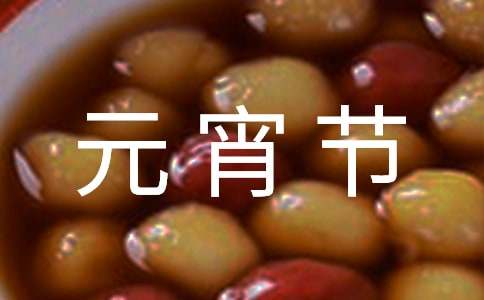- 相关推荐
元宵节风俗中英文版
元宵节有哪些风俗大家是否知晓呢?下面是应届毕业生小编为大家收集的关于元宵节风俗中英文版,欢迎大家阅读!

元宵节风俗中英文版 1
The Yuanxiao Festival is on the 15th day of the first Chinese lunar month. It is closely related to the Spring Festival. In the old days, people began preparing for the Spring Festival about 20 days before. However, the Yuanxiao Festival marks the end of the New Year celebrations. And after the Yuanxiao Festival, everything returns to normal.
农历正月十五日是元宵节,紧随春节之后。古时候,人们提前二十天为“春节”做准备,然而,元宵节为春节画上了句号,元宵之后,一切归于平常。
Yuan literally means first, while Xiao refers to night. Yuanxiao is the first time when we see the full moon in the New year. It is traditionally a time for family reunion. The most prominent activity of the Yuanxiao Festival is the display of all types of beautiful lanterns. So the occasion is also called the Lantern Festival.
“元”是第一的意思,“霄”指夜晚。元宵就是新年首个夜晚,元宵节是家庭团聚的传统佳节,最隆重的活动就是展挂各种各样美丽的灯笼,故此,元宵节又叫“灯节”。
There are many beliefs about the origin of the Lantern Festival. But one thing for sure is that it had something to do with religious worship.
关于元宵节的起源之说多种多样,但是最确切的一种说它跟宗教信仰有关。
One legend tells that it was a time to worship Taiyi, the God of Heaven in ancient times. The belief was that the God of Heaven controlled the destiny of the human world. He had sixteen dragons at his back and call. It was him who decided when to inflict drought, storms, famine or pestilence upon human beings. Beginning with Qinshihuang, the first emperor united the country, all subsequent emperors ordered splendid ceremonies each year. The emperor would ask Taiyi to bring favorable weather and good health to him and to his people. Emperor Wudi of the Han Dynasty directed special attention to this event. In 104 BC, he proclaimed it one of the most important celebrations and the ceremony would last throughout the night.
有这样一个传说,元宵节是拜“太乙”神的日子,太乙是古代的天神。古人认为天神掌管着人类世界的命运,太乙手下有九条龙听他使唤,他决定人间什么时候遭遇饥荒瘟疫之祸,什么时候受旱灾水涝之苦。从统一中国的第一个皇帝秦始皇开始,每年都举行盛大的仪式,皇帝祈求“太乙”神赐予他和臣民们风调雨顺、健康长寿。汉武帝对元宵灯会特别重视,元封七年(公元前104年),他把元宵钦定为最重要的'佳庆之一,庆祝仪式通宵进行。
Another legend associated with the Lantern Festival is Taoism. Tianguan is the Taoist god responsible for good fortune. His birthday falls on the 15th day of the first lunar month. It is said that Tianguan likes all types of entertainment. So his followers prepare various kinds of activities during which they pray for good fortune.
另一个传说认为“灯节”与道教有关。“天官”是道教的神,专管人间祥运,他出生于农历正月十五。相传“天官”喜乐,所以他的信徒们就准备了各种各样的活动,祈求好运。
The third story about the origin of the festival goes like this. Buddhism first entered China during the reign of Emperor Mingdi of the Eastern Han Dynasty. That was in the first century. However, it did not exert any great influence among the Chinese people. One day, Emperor Mingdi had a dream about a gold man in his palace. At the very moment when he was about to ask the mysterious figure who he was. The gold man suddenly rose to the sky and disappeared in the west. The next day, Emperor Mingdi sent a scholar to India on a pilgrimage to locate Buddhist scriiptures. After journeying thousands of miles, the scholar finally returned with the scriiptures. Emperor Mingdi ordered that a temple be built to house a statue of Buddha and serve as a repository for the scriiptures. Followers believe that the power of Buddha can dispel darkness. So Emperor Mingdi ordered his subjects to display lighted lanterns during what was to become the Lantern Festival.
还有一种传说认为元宵节与佛教有关。东汉明帝时期,佛教进入中国,这也是佛教首次传入中国,然而,佛教并没有对中国人产生多大影响。一日,明帝做了个梦,梦见皇宫里有个金人,正当他准备问清这个神秘人物的身世时,金人突然升入天空,消失在西面。次日,明帝委派一位学士去印度开始了他的取经之旅,经过几千里的长途跋涉,学士终于带回了经卷。汉明帝下令建造一所寺庙供佛雕安身、收藏经书。佛徒们相信佛能驱走黑暗,所以汉明帝宣昭他的臣民们张灯结彩,这样就形成了“灯节”。
The custom of lighting lanterns continued. However, the lanterns would develop from simple ones to those of various color and shape. The scale of the celebration also increased greatly.
张灯的习俗得以延续传承,然而,灯盏由简朴到华贵,样式繁多,庆贺的规模也愈来愈大。
元宵节风俗中英文版 2
元宵节风俗:闹花灯、踩高跷、吃元宵、舞狮子、猜灯谜、游龙灯、迎紫姑、放烟花、扭秧歌、打太平鼓等。闹花灯是元宵节传统节日习俗,始于西汉,兴盛于隋唐。隋唐以后,历代灯火之风盛行,并沿袭传于后世。而正月十五,又是一年一度的闹花灯放烟火的高潮。
1、吃“元宵”
正月十五吃元宵,是在中国由来己久的习俗,元宵即“汤圆”,代表着团团圆圆和和美美,日子越过越红火。
2、送花灯
在元宵节前,娘家送花灯给新嫁女儿家,或一般亲友送给新婚不育之家,以求添丁吉兆,因为“灯”与“丁”谐音。表示希望女儿婚后吉星高照、早生麟子;如女儿怀孕,则除大宫灯外,还要送一两对小灯笼,祝愿女儿孕期平安。
3、耍龙灯
龙是中华的图腾,中华民族崇尚龙,把龙作为吉祥的`象征。正月十五舞龙灯,载歌载舞的喜气氛围,流传于很多的地方。
Customs of the Yuanxiao (Filled round balls made of glutinous rice-flour for Lantern Festival) Festival: Lantern Festival, walking on stilts, eating Yuanxiao (Filled round balls made of glutinous rice-flour for Lantern Festival), lion dance, riddle guessing, dragon lantern, greeting Zigu, fireworks, Yangge dance, playing Taiping Drum, etc. Making lanterns is a traditional festival custom of the Yuanxiao (Filled round balls made of glutinous rice-flour for Lantern Festival) Festival, which began in the Western Han Dynasty and flourished in the Sui and Tang Dynasties. After the Sui and Tang dynasties, the tradition of lantern lights prevailed throughout history and was passed down to future generations. On the fifteenth day of the first lunar month, it is also the peak of the annual fireworks display.
1. Eat "Yuanxiao (Filled round balls made of glutinous rice-flour for Lantern Festival)"
Eating Yuanxiao (Filled round balls made of glutinous rice-flour for Lantern Festival) on the 15th day of the first lunar month is a long-standing custom in China. Yuanxiao (Filled round balls made of glutinous rice-flour for Lantern Festival), also known as "rice dumpling", represents reunion and harmony. The days are getting more prosperous.
2. Flower lantern
Before the Yuanxiao (Filled round balls made of glutinous rice-flour for Lantern Festival) Festival, the parents sent lanterns to the newly married daughters house, or ordinary relatives and friends sent lanterns to the newly married infertile family in order to add Ding Jizhao, because "lamp" is homophonic with "Ding". I hope my daughter will have a bright future after marriage and have a baby named Linzi early; If your daughter is pregnant, in addition to the big palace lamp, you should also give one or two pairs of small lanterns as a gift, wishing your daughter a safe pregnancy.
3. Playing dragon lanterns
The dragon is a totem of China, and the Chinese nation worships the dragon as a symbol of auspiciousness. The festive atmosphere of singing and dancing with dragon lanterns on the fifteenth day of the first lunar month has been passed down in many places.
【元宵节风俗中英文版】相关文章:
元宵节饮食风俗06-27
元宵节的风俗习惯11-07
元宵节猜灯谜英文版10-01
元宵节风俗习惯手抄报07-10
2023年中秋节的来历和风俗09-13
英文版简历06-05
英文版的简历06-09
(英文版) 毕业赠言09-21
英文版的获奖感言07-25
英文版自我评价07-30